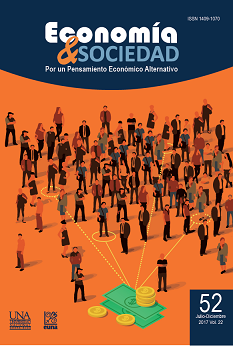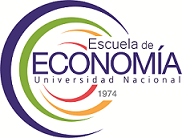Identificación de factores que afectan las industrias individuales
DOI:
https://doi.org/10.15359/eys.22-52.4Palabras clave:
Industrias únicas, Industrias basadas en el conocimiento, Política industrial, Clasificación, TOPSISResumen
En el mundo moderno de hoy, el alto conocimiento y la tecnología se están convirtiendo rápidamente en una ventaja competitiva. Las industrias individuales son consideradas como uno de los sectores clave en la industria del país. Clasificar los factores que afectan a este tipo de industrias nos hace estar más familiarizados con su efectividad y, por tanto, tomar acciones para mejorarlos en las empresas basadas en el conocimiento. Con el fin de alcanzar este objetivo, tras revisar las investigaciones que se han realizado en el área de industrias individuales, a través del método de campo y utilizando un cuestionario aplicado por el investigador, el presente estudio investiga y clasifica los factores que afectan al establecimiento de estas industrias.
En cuanto a su finalidad, se trata de una investigación aplicada, y en términos de recogida de datos, se considera una encuesta descriptiva. Utilizando el método censal se recolectaron 60 cuestionarios. Los factores efectivos se clasificaron utilizando el software SPSS y técnica TOPSIS.
Los resultados de este estudio sugieren que los factores de contenido ocupan el primer lugar y los factores contextuales y estructurales, el segundo y tercer lugar, respectivamente. Por lo tanto, se recomienda a ejecutivos y gerentes en industrias individuales enriquecer las normas de empresa conjunta y los valores y creencias dominantes en las empresas basadas en el conocimiento, con el fin de lograr el crecimiento y el desarrollo de este tipo de industrias.
Referencias
Battaglia, A. (2014). Creative industries and knowledge economy development in Rome: the example of Pietralata District. International Journal of Knowledge-Based Development, 5(3), 238-252. doi: https://doi.org/10.1504/ijkbd.2014.065316
Cabrita, M., Cruz-Machado, V., & Cabrita, C. (2013). Managing creative industries in the context of knowledge-based urban development. International Journal of Knowledge-Based Development, 4(4), 318-337. Doi: https://doi.org/10.1504/ijkbd.2013.058524
Chathoth, P. (2005). Strategic alliances in the high-tech industry. Logos-Verlag: Germany. https://doi.org/10.4324/9780080914343.ch10
Chang, H-J., Andreoni, A. & Kuan, M. (2013). International industrial policy experiences and the lessons for the UK (Working Paper No. 450). Retrieved from https://www.cbr.cam.ac.uk/fileadmin/user_upload/centre-for-business-research/downloads/working-papers/wp450.pdf
Chen, X. (2012). Varying Significance of Influencing Factors in Developing High-Tech Clusters: Using Cities of the U.S. and China as Example (Master's Thesis). Retrieved from web site of Columbia University: https://academiccommons.columbia.edu/.../Xia_Chen-HIGH-TECH_CLUSTERS.pdf
Cloodt, M., Hagedoorn, J., & Van Kranenburg, H. (2006). Mergers and acquisitions: Their effect on the innovative performance of companies in high-tech industries. Research policy, 35(5), 642-654. doi: https://doi.org/10.1016/j.respol.2006.02.007
Crandall, R., & Jackson, C. (2011). Antitrust in high-tech industries. Review of Industrial Organization, 38(4), 319-362. doi: https://doi.org/10.1007/s11151-011-9298-4
Deutch, J. (2005). What should the government do to encourage technical change in the energy sector? (Report No.120). Retrieved from web site of MIT Joint Program on the Science and Policy of Global Change: http://web.mit.edu/globalchange/www/MITJPSPGC_Rpt120.pdf
Dhéret, C., & Morosi, M. (2014). Towards a New Industrial Policy for Europe. European Policy Centre, (78). Retrieved from http://aei.pitt.edu/57931
Donate, M. J., & Guadamillas, F. (2011). Organizational factors to support knowledge management and innovation. Journal of Knowledge Management, 15(6), 890-914. doi: https://doi.org/10.1108/13673271111179271
Elia, G., Petti, C., & Sarcina, A. (2016). Promoting communities of innovation: Do industrial policies matter? International Journal of Knowledge-Based Development, 7(3), 207-224. doi: https://doi.org/10.1504/ijkbd.2016.078522
Federal Ministry of Education and Research. (2014). The new High-Tech Strategy Innovations for Germany, federal ministry of education and research. Retrieved from https://www.bmbf.de/pub/HTS_Broschuere_eng.pdf
Gambarotto, F., Bolisani, E., & Scarso, E. (2011). Mapping knowledge territories for development policies. International Journal of Knowledge-Based Development, 2(1), 16-33. doi: https://doi.org/10.1504/ijkbd.2011.040624
Gorji, E., & Alipourian, M. (2011). The Knowledge Economy and the Knowledge Assessment Methodology. Iranian Economic Review, 15(29), 43-72. Retrieved from https://ier.ut.ac.ir/article_32722.html
Hatakenaka, S. (2015). The role of higher education institutions in innovation and economic development. International Higher Education, 47. doi: https://doi.org/10.6017/ihe.2007.47.7961
Hawkins, B., Rudy, J. & Wallace, W. (2002). Technology Everywhere: A Campus Agenda for Educating and Managing Workers in the Digital Age (Vol. 6). Retrieved from https://www.educause.edu/ir/library/pdf/pub7006a.pdf
Heaidari, M. Moghimi, S. & Khanifar, H. (2011). The critical success factors in implementing knowledge management: agricultural organization in Islamic Republic of Iran, 1(2), 45-64. Retrieved from http://farabi.ut.ac.ir/elmi/teachers/Article_B_41.pdf
Khajeheian, D. (2016). Telecommunication Policy: Communication Act Update. Global Media Journal, 9(1), 135-141. Retrieved from http://www.gmj.uottawa.ca/1601/v9i1_khajeheian.pdf
Khajeheian, D., & Tadayoni, R. (2016). User innovation in public service broadcasts: creating public value by media entrepreneurship. International Journal of Technology Transfer and Commercialisation, 14(2), 117-131. doi: https://doi.org/10.1504/ijttc.2016.081635
Law, K. M. (2010). Factors affecting sustainability development: high-tech manufacturing firms in Taiwan. Asia Pacific Management Review, 15(4), 619-633. Retrieved from http://apmr.management.ncku.edu.tw/comm/updown/DW1012213796.pdf
Lee, K. C., Lee, S., & Kang, I. W. (2005). KMPI: measuring knowledge management performance. Information & Management, 42(3), 469-482. doi: https://doi.org/10.1016/j.im.2004.02.003
Lo, D., & Wu, M. (2014). The state and industrial policy in Chinese economic development. In: Salazar-Xirinachs, J. M. and Nübler, I. and Kozul-Wright, R., (eds.), Transforming Economies: Making industrial policy work for growth, jobs and development. Geneva: International Labour Office, 307-326. Retrieved from http://eprints.soas.ac.uk/20572
Matthew, D. Joro, I. D., & Manasseh, H. (2015). The Role of Information Communication Technology in Nigeria Educational System, International Journal of Research in Humanities and Social Studies, 2(2), 48-66. http://www.ijrhss.org/pdf/v2-i2/8.pdf
Poorzaman, J., Yusefi, E., Soleimani, M. & Hemmatyar, M. (2014). The Role of Critical Success Factors for Implementing Knowledge Management on Corporate Entrepreneurship, International Research Journal of Management Sciences, 2(3), 91-99. Retrieved from http://irjmsjournal.com/wp-content/uploads/paper351.pdf
Sadeghi, A., Azar, A., & Rad, R. S. (2012). Developing a fuzzy group AHP model for prioritizing the factors affecting success of high-Tech SME's in Iran: A Case Study. Procedia-Social and Behavioral Sciences, 62, 957-961. Retrieved from https://doi.org/10.1016/j.sbspro.2012.09.163
Salamzadeh, A., Kesim, H. K., & Salamzadeh, Y. (2016). Entrepreneurial universities and branding: A conceptual model proposal. World Review of Science, Technology and Sustainable Development, 12(4), 300-315. doi: https://doi.org/10.1504/wrstsd.2016.082188
Salamzadeh, Y. Ardakani, S. & Zanjirchi, M. (2009). What should we do now? Analysis of the globalization challenges in Iranian SMEs: a Study on Food Industries of Hamadan Province using Fuzzy MADM Approach. Annals of University of Bucharest, Economic and Administrative Series, 3, 165-178. http://annalseas.faa.ro/download/10%2520Yashar.pdf
Salamzadeh, Y., Nejati, M., & Salamzadeh, A. (2014). Agility path through work values in knowledge-based organizations: a study of virtual universities. Innovar, 24(53), 177-186. doi: https://doi.org/10.15446/innovar.v24n53.43942
Salamzadeh, Y., YousefNia, M. Radovic Markovic, M. & Salamzadeh, A. (2016). Strategic management development: the role of learning school on promotion of managers’ competence, Economía y Sociedad, 21(50), 1-25. doi: https://doi.org/10.15359/eys.21-50.4
Sepehrdoust, H., & Zamani Shabkhaneh, S. (2015). Impact of Knowledge-based Components on Total Factor Productivity of MENA Countries. Iranian Economic Review, 19(2), 149-163. Retrieved from https://ier.ut.ac.ir/article_56076_7434.html
Sharabi, M., Arian, O., & Simonovich, J. (2012). High-Tech and Public Sectors Employees' Perception of Factors Influencing Promotion. International Journal of Business and Social Science, 3(1), 116-130. Retrieved from http://citeweb.info/20122428425
Tan, F. B., & Leewongcharoen, K. (2005). Factors contributing to IT industry success in developing countries: The case of Thailand. Information Technology for Development, 11(2), 161-194. doi: https://doi.org/10.1002/itdj.20009
Wang, CH. & Chang Hu. L, (2014). Building exploration and exploitation in the high-tech industry: The role of relationship learning. Technological Forecasting and Social Change, 81, 331-340. doi: https://doi.org/10.1016/j.techfore.2013.04.008
Wolf, M. & Terrell, D. (2016). The high-tech industry, what is it and why it matters to our economic future? Retrieved from http://digitalcommons.ilr.cornell.edu/key_workplace/1566
Publicado
Cómo citar
Número
Sección
Licencia
Esta publicación está adscrita a Creative Commons; deben respetarse sus atribuciones y restricciones.
Los autores/as que publiquen en esta revista aceptan las siguientes condiciones:
- Los autores/as conservan los derechos de autor y ceden a la revista el derecho de la primera publicación, con el trabajo registrado con la Licencia Creative Commons Atribución-NoComercial-CompartirIgual 4.0 Internacional, que permite a terceros utilizar lo publicado siempre que mencionen la autoría del trabajo y a la primera publicación en esta revista.
- Los autores/as pueden realizar otros acuerdos contractuales independientes y adicionales para la distribución no exclusiva de la versión del artículo publicado en esta revista (p. ej., incluirlo en un repositorio institucional o publicarlo en un libro) siempre que indiquen claramente que el trabajo se publicó por primera vez en esta revista.
- Se permite y recomienda a los autores/as a publicar su trabajo en Internet (por ejemplo en páginas institucionales o personales) antes y durante el proceso de revisión y publicación, ya que puede conducir a intercambios productivos y a una mayor y más rápida difusión del trabajo publicado.

Revista Economía y Sociedad by Universidad Nacional is licensed under a Creative Commons Reconocimiento-NoComercial-CompartirIgual 4.0 Internacional License.
Creado a partir de la obra en http://www.revistas.una.ac.cr/index.php/economia









